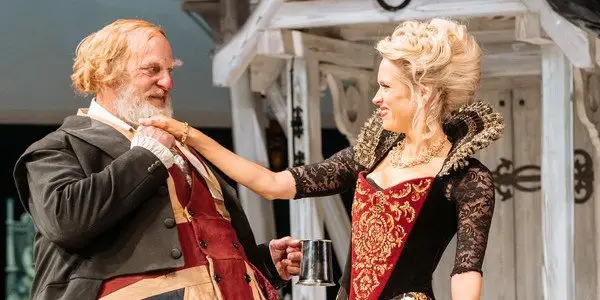Merry Wives of Windsor tells the tale of a lecher who is a buffoon. Presuming to have been given the “leer of invitation” by either or both of two married women in the town where he has lately arrived, he desires to make love to whomever will have him. Shakespeare’s malodorous, potbellied specimen of manhood may induce us to be sympathetic because he is pathetic. At the time, “make love” would have meant to engage in romantic conversation, and even that is beyond his reach. Perhaps a suitor such as he best be bumbling. Otherwise he would be an unwelcome intruder in our uncomfortable age.
Wives is reputed to have been personally commissioned by Queen Elizabeth because the protagonist of appetite and girth, Sir John Falstaff, charmed her, and she insisted he tread the boards within a fortnight. It could be regarded as an early example of a prequel, because the drunken knight was killed off in the sober historical plays as Henry V comes into his own as a ruler. In order for this farce to feature him, the story had to be set prior to the scripts that were written earlier.
Whether because of its origins or its hasty composition, critics have not been kind to this entry into the Bard’s canon. That is no matter. His genius was such that even these supposedly lesser works have great merit.
What Is a Lecher to Do?
This production is not only modern in dress from blue jeans and leather jackets on the street, to bath robes and designer purses at the beauty parlor, but also in attitude. Falstaff, larger than life in every sense, receives his comeuppance in the original, because the women of the title are his betters. Yet in this version, the issues of gender and class are rendered more sharply.

As the actor, David Troughton, portraying the full-figured fellow explains in a commentary before the festivities commence, his pursuit of women is “ridiculous,” which elevates it to the humorous, above the “grasping” and the “horrid.” While he is an old-fashioned right-wing Tory who would vote for Brexit, Troughton continues, this diversion is, after all, a comedy. (The only remaining protest from modern attitudes would be about body shaming. Falstaff is identified expressly, and repeatedly, as “fat.” His physique is integral to his predicament. A buff courtier would ruin the fun.)
The women who would suffer Falstaff will not fall for his schemes. He is more naive than they. He carelessly uses a form letter for his correspondence courting his prey. The recipients compare notes and determine to conspire against the greasy boor who cannot keep food stains off his ruffled shirt.
There is a subplot about other set-ups. The tricks have to be carried off lightly to avoid veering into drama, or, worse, melodrama.
Falstaff fancies himself the proverbial “lady killer” before the term had been invented — though the line about “the world being one’s oyster” has its origins here. He displays no self-awareness. His motivations are less lascivious than fiscal. He woos in the hope of alleviating debt. His plans, which at least seem sincere, must come to nothing, less to do with justice for the characters than to provide laughs for the audience.
How Is the Stage Brought to the Screen?
This feature shows how live theatre, movies, and streaming can be blended together. There is a new medium that has emerged, in which “legitimate” theatre is broadcast, either simultaneously or via recording. Carried out competently, as here, it is neither stage nor film, but a unique format that can be enjoyed in its own right. The opening, for example, with an animated queen’s head assigning the playwright the task of penning a piece with Falstaff would not have been possible until the cinema.
The fluid camera throughout the introduction adds both the creativity of angles an audience member could not experience and the control of the director as to that perspective. An announcer segues into pre-recorded filler material during the intermission to give the episode the feel of a sporting event. That digression into the costume shop also exhibits good taste. Anyone new to the Royal Shakespeare Company will be delighted to discover their “live” series.
This The Merry Wives of Windsor is the amusement it was intended to be. The production values are high. The elocution is to be aspired to. A viewer need have no knowledge of Shakespeare nor appreciation of iambic pentameter.
It begins restrained before becoming raucous. The acceleration into Falstaff’s humiliation is the point. You might take pity. Like Malvolio in Twelfth Night, his punishment could be disproportionate, because it is so ruinous, except his victims become his hosts, leaving all of us less troubled.
It all comes together very quickly. This would make for a high culture date night. It would be sure to provoke conversation. The sophistication is without pretense.
Have you had a chance to see The Merry Wives of Windsor? What did you think of it? Let us know in the comments below!
The Merry Wives of Windsor was broadcast live on September 12, 2018, and is available in the RSC Live series available from Trafalgar Releasing.
Does content like this matter to you?
Become a Member and support film journalism. Unlock access to all of Film Inquiry`s great articles. Join a community of like-minded readers who are passionate about cinema - get access to our private members Network, give back to independent filmmakers, and more.